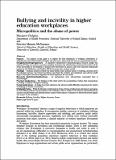| dc.contributor.author | Hodgins, Margaret | |
| dc.contributor.author | Mannix McNamara, Patricia | |
| dc.date.accessioned | 2019-08-21T11:40:35Z | |
| dc.date.available | 2019-08-21T11:40:35Z | |
| dc.date.issued | 2017-09-11 | |
| dc.identifier.citation | Hodgins, M. and Mannix McNamara, P. (2017), "Bullying and incivility in higher education workplaces", Qualitative Research in Organizations and Management, Vol. 12 No. 3, pp. 190-206. https://doi.org/10.1108/QROM-03-2017-1508 | en_IE |
| dc.identifier.issn | 1746-5648 | |
| dc.identifier.uri | http://hdl.handle.net/10379/15339 | |
| dc.description.abstract | Purpose - The purpose of this paper is to explore the lived experiences of workplace ill-treatment of administrative and technical staff in the higher education sector, with a particular focus on organisational response.Design/methodology/approach - A qualitative interpretative phenomenological research design was employed. Using non-random, purposive sampling strategies nine self-selecting participants from three of the seven universities in the Republic of Ireland were interviewed in person. Data were analysed thematically employing the Pietkiewicz and Smith's (2012) four-stage data analysis model.Findings - Thematic analysis yielded four main themes: micro-political nature of bullying, cynicism about the informal response, the formal procedures exacerbate the problem and significant and adverse health impact. Participant narratives engender the lived experience for the reader.Research limitations/implications - As participants were self-selecting respondent bias is acknowledged.Practical implications - The findings of this study add to the accumulating evidence that organisations are failing to address workplace bullying.Social implications - In failing to protect employees, the adverse health difficulties experienced by targets of bullying are further exacerbated.Originality/value - While the literature yields much in terms of types of behaviours and impact, and argues for anti bullying policies and procedures in the workplace, what is evident is the selective organisational use of policy and procedures and inherent biases in place which expose a reluctance to effectively protect dignity and respect in the workplace. | en_IE |
| dc.format | application/pdf | en_IE |
| dc.language.iso | en | en_IE |
| dc.publisher | Emerald | en_IE |
| dc.relation.ispartof | Qualitative Research In Organizations And Management | en |
| dc.rights | Attribution-NonCommercial-NoDerivs 3.0 Ireland | |
| dc.rights.uri | https://creativecommons.org/licenses/by-nc-nd/3.0/ie/ | |
| dc.subject | Bullying | en_IE |
| dc.subject | Incivility | en_IE |
| dc.subject | Higher education | en_IE |
| dc.subject | Power | en_IE |
| dc.subject | WORK | en_IE |
| dc.subject | HEALTH | en_IE |
| dc.subject | INTERVENTIONS | en_IE |
| dc.subject | EXPOSURE | en_IE |
| dc.subject | IMPACT | en_IE |
| dc.title | Bullying and incivility in higher education workplaces: Micropolitics and the abuse of power | en_IE |
| dc.type | Article | en_IE |
| dc.date.updated | 2019-07-30T13:05:54Z | |
| dc.identifier.doi | 10.1108/QROM-03-2017-1508 | |
| dc.local.publishedsource | https://doi.org/10.1108/QROM-03-2017-1508 | en_IE |
| dc.description.peer-reviewed | peer-reviewed | |
| dc.internal.rssid | 13286681 | |
| dc.local.contact | Margaret Hodgins, Ctr For Health Promotion Studies, Aras Moyola, Nui Galway. 3349 Email: margaret.hodgins@nuigalway.ie | |
| dc.local.copyrightchecked | Yes | |
| dc.local.version | ACCEPTED | |
| nui.item.downloads | 590 | |


